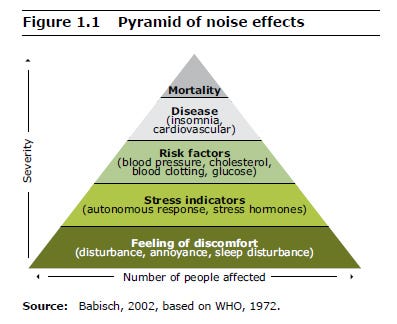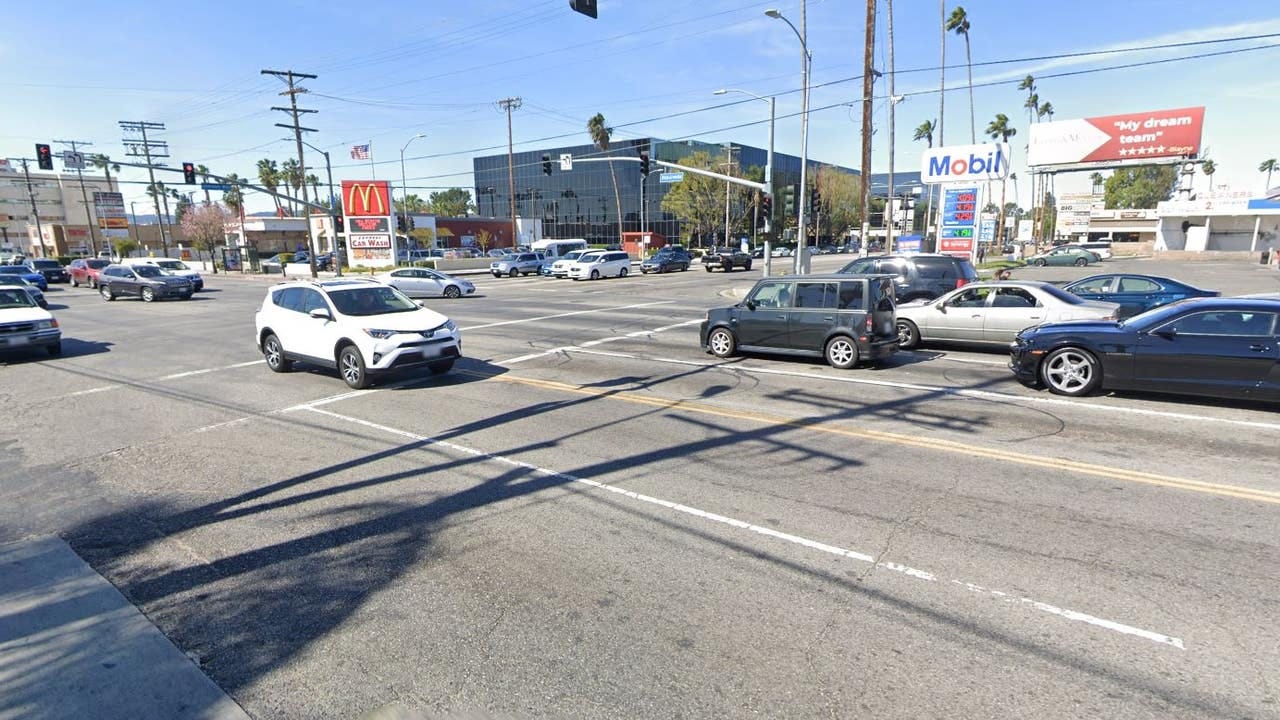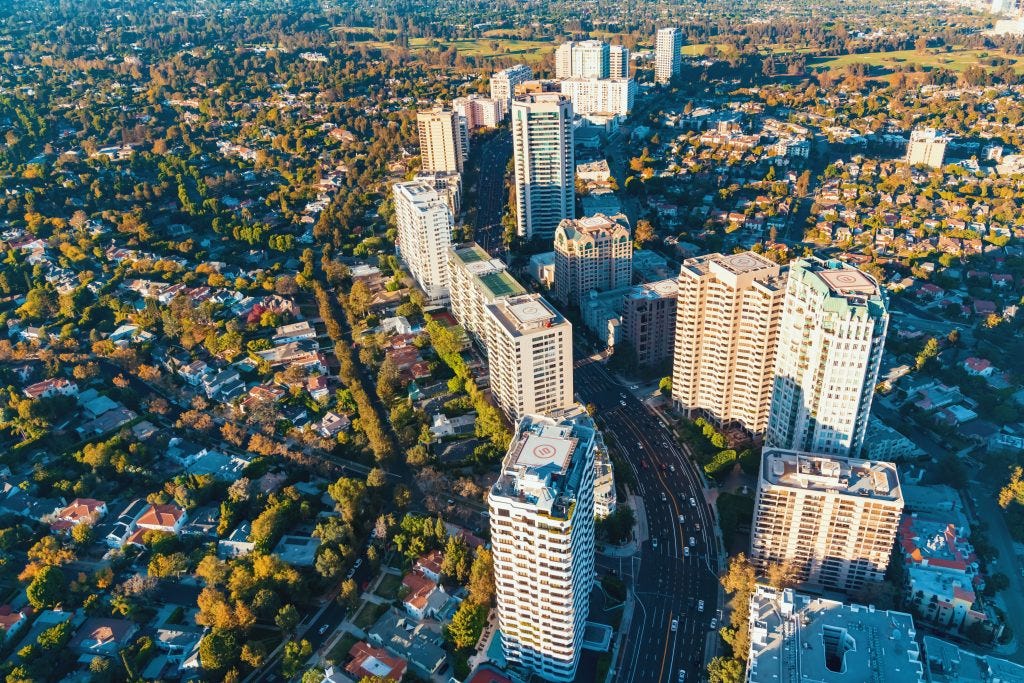We Need To Do Something About Noise Pollution
Excessive noise isn't just annoying... it's dangerous
Last month, I was walking through Chelsea, in the center of Manhattan. It’s one of the densest neighborhoods in the country, with over 60,000 people per square mile. As I was walking, a souped-up motorcycle was driving up 8th Ave, emitting an ear-splintering roar. Almost everyone walking on the street nearby plugged their ears as this motorcycle passed, clearly causing an annoyance for the hundreds of people walking on the street and the thousands living on the block. I recently tweeted about this experience and even though most of the replies agreed with me, a few people thought that noise pollution was a mere annoyance and I should just suck it up and deal with it.
But more and more studies are coming out showing that noise is more than just a matter of preference. Rather, noise pollution is a serious public health risk that requires public policy interventions.
How Bad is Noise Pollution Really?
It’s bad. More and more studies keep coming out showing that repeated exposure to loud noise triggers the body’s fight-or-flight mechanism which raises stress levels and blood pressure. Additionally, loud noise disrupts sleep and reduces brain health, with a recent study in Denmark finding that noise pollution was linked to a significantly increased risk of Alzheimer’s and dementia. Harvard Medical School notes that noise pollution not only drives hearing loss, tinnitus, and hypersensitivity to sound, but can cause or exacerbate cardiovascular disease; type 2 diabetes; sleep disturbances; stress; mental health and cognition problems, including memory impairment and attention deficits; childhood learning delays; and low birth weight.
Another recent study found that “After adjusting for other factors that contribute to cardiovascular risk (including air pollution), every 5-decibel increase in the average 24-hour noise level was associated with a 34% increase in heart attacks, strokes, and other serious heart-related problems”.
So, the evidence suggests pretty strongly that noise pollution is pretty bad. But the next question is what public policy levers can be pulled to fix it.
How Do We Fix It?
One of the most frustrating parts of my research on this issue is finding out that there’s actually already a federal law governing noise pollution: the Noise Control Act of 1972 and the Quiet Communities Act of 1978. However, in 1982 under President Reagan, the EPA’s funding to enforce the law was rescinded and the law has remained unenforced ever since, with noise pollution regulation essentially delegated to state and local governments. Additionally, while many states and cities have laws governing sources of noise pollution, these laws are rarely enforced and largely ignored.
There are plenty of sources of noise pollution, from leafblowers to airplanes to heavy machinery. For most people, though, cars are one of the most prevalent sources of noise pollution. Many people assume cities are inherently loud but that isn’t true - it’s all the cars that are loud. Go to a car-free street or Central Park in the middle of Manhattan and it’s surprisingly peaceful and quiet. I was recently walking through the West Village, one of the densest neighborhoods in the country with dozens of people on the street but very few cars. According to the decibel meter app on my phone, the average noise on the street in the West Village is only 45 decibels, comparable to “a quiet home”.
The issue is the cars. And there are two types of car noise: chronic noise pollution from the heightened background noise of a highway with cars. And acute noise pollution from a single modified car or motorbike revving its engine or a car excessively honking.
That said, there are obviously trade-offs here. We can’t get rid of cars everywhere and can’t ban flights. But there are a whole host of common-sense policies that can be enacted to address the scourge of noise pollution.
Here’s how we can fix it:
Target the worst offenders of acute noise pollution.
Excessive car noise detection: in New York, the Stop Loud and Excessive Exhaust Pollution Act, or the SLEEP Act, went into effect last year and raised fines for illegal modifications of mufflers and exhaust systems. This is a great first start, however, only 71 cars were ticketed in a pilot program last year. One thing that this program gets right, though, is using automated noise measuring technology to issue tickets rather than having police officers manually address the issue, which would result in increased traffic stops and conflict. These noise detection radars should be placed all across the city and used to issue tickets to all of these modified noisy vehicles - and it looks like that citywide expansion is starting to happen, which is great news. Additionally, if a vehicle receives multiple tickets, it should be impounded until the driver fixes the issue
Gas-powered leaf blower bans are another common-sense policy that is picking up steam across the country. Gas-powered leaf blowers are incredibly loud and burn fuel inefficiently, creating a ton of pollution. Additionally, electric leafblowers are becoming more popular and are actually rated higher than gas-powered ones. Call your state and local legislators and ask them to look into a gas-powered leaf blower ban.
Enforce honking bans: Car horns exist as a last-ditch warning system in the event of danger. They don’t exist for angry drivers to slam on to express their frustration with traffic, despite what most New York City drivers seem to think. This is despite the fact that New York City already has a honking ban. This honking ban is so poorly enforced that the city actually took down “no honking” signs. Instead, we should put those signs back up and have traffic control officers start issuing fines. It’s not fair for pedestrians to be subject to honking 24/7.
Fix car alarms. Everyone has dealt with annoying car alarms. Studies have found that 95-99% of all car alarms are false alarms, essentially making them worthless since people just assume anytime the alarm goes off it’s a false positive. This is backed up by research showing that car alarms fail to accomplish their goal of reducing theft. Instead of annoying, loud car alarms that accomplish nothing, the focus should be on ensuring cars have immobilizers (the lack of which is causing the upswing in Kia/Hyundai thefts), along with police doing a better job of tracking down car-theft rings.
Target roadway noise pollution
Cap or remove urban highways. In urban areas, highways are one of the most prominent sources of noise pollution. According to the Federal Highway Administration, “levels of highway traffic noise typically range from 70 to 80 dB(A) at a distance of 15 meters (50 feet) from the highway. These levels affect a majority of people, interrupting concentration, increasing heart rates, or limiting the ability to carry on a conversation”. Highways through dense urban areas right by where people live are a major factor in reducing the quality of life due to noise, traffic, and pollution. The recent bipartisan infrastructure bill has $1 billion for a “Reconnecting Communities” program that addresses this, but far more money should be invested in this program to address the urban highways across the country. Additionally, we must stop widening urban highways like Texas is doing in Houston and Austin. We know urban highways are an expensive boondoggle that just makes traffic worse. We are already spending money to get rid of these highways. So why are we spending even more money to build more of these highways?
Slow down! In suburban areas where removing or capping a highway may not be feasible, the next best option is to at least reduce speeds on highways that go through populated areas. Raising the speed of an automobile 10 mph (from 55 to 65 mph) increases the noise made by that vehicle 3 dB, from 72 dB to 75 dB, and noise made by trucks increases from 86 to 88 dB. The same goes for major arterial roads with speed limits of 45mph that are so common. Additionally, there should be automated enforcement to prevent the speeding that’s so common in the US.
Fix zoning: Many parts of the US have rules that “protect” single-family neighborhoods and concentrate dense housing along highways and other large arterial roadways. Some planners even claim that we should “shield, to some extent, adjacent single-family homes from the noise of arterial traffic, …act[ing] as a buffer”. This is entirely backward. We shouldn’t be putting dense new housing with tons of people on crowded roads where they will be subject to dirty air and noise pollution. Instead, we should look to Europe where dense housing is built in quiet neighborhoods along peaceful streets. Additionally, we should be building dense housing in existing neighborhoods so fewer people need to drive and we don’t have to keep extending car-oriented suburban sprawl.
Encourage alternatives to driving: The reason the West Village is so quiet is that there are so few cars. Almost everyone in the neighborhood is getting around via bike, subway, or walking. We should build more bike lanes, transit, and pedestrian-oriented streets to reduce the number of cars, and noise on the road.
Other good programs!
Plant trees: Trees have all sorts of benefits, from providing shade that reduces the urban heat island effect to serving as a buffer that absorbs street noise. Planting more trees is an easy, popular, and environmentally friendly way to damper noise pollution.
Build soundproof buildings: There are no formal soundproofing standards, but laws that require buildings to post average nighttime noise levels in apartments could encourage developers to be more thoughtful and proactive about how they are soundproofing new buildings. Additionally, many of the technologies that improve soundproofing for existing (better windows and insulation) are already being subsidized by the IRA for their climate benefits.
Discourage helicopter usage: In New York City, helicopter noise complaints have skyrocketed due to an increase in flights targeted at the uber-wealthy and tourists. While some helicopter usage is a necessity (particularly for medical emergencies), non-essential helicopter usage should be subject to an extremely large tax discouraging use, (as an added bonus, the revenue could be used to support soundproofing upgrades for public housing). While a bill to just that stalled in the NYC legislature last year, you should call your state and local representatives to ask them to bring it back.
Electrify everything: Internal combustion engines are just generally loud. In addition to electric leaf blowers, we should be electrifying cars, motorbikes, buses, and trains - the lack of electrified rail puts us way behind other developed countries on this front. As an added bonus, there’s less pollution as well (although EVs are not perfect and have a whole host of other tradeoffs as I described here)
As one last caveat, I want to say a few things that some people get wrong about noise pollution. First is that students are not noise pollution, despite what some NIMBYs in California think. I live across the street from a school and the sound of students talking and laughing is much less loud than a modified motorcycle according to my decibel meter. Additionally, there was recently a popular Atlantic article claiming “the sound of gentrification is silence”. While the underlying premise of this is correct - that richer people have the means to move into more quiet neighborhoods and will sometimes rely on police to enforce the quiet, it fails to even mention the negative health impacts of noise pollution. The solution to this is to fight for the policies detailed above that would benefit everyone, particularly poorer people who currently suffer the worst negative health impacts from noise pollution.
It’s about time we do something about this instead of accepting the status quo.





100% agree with this. When I lived in Texas, it was loud modified pickup trucks that sounded like a small airplane taking off. Now that I live in the Bay Area, it’s loud modified Dodge Chargers and muscle cars. But in all cases, it’s always some lame bro behind the wheel desperately craving attention.
Excellent post! And to add one more area of noise-concern: restaurants! When/why did they get so miserably loud? Well, at least re crazy-loud restaurants in SF, this article sheds some light:
https://www.sfgate.com/food/article/bay-area-restaurants-sensory-nightmare-18459785.php